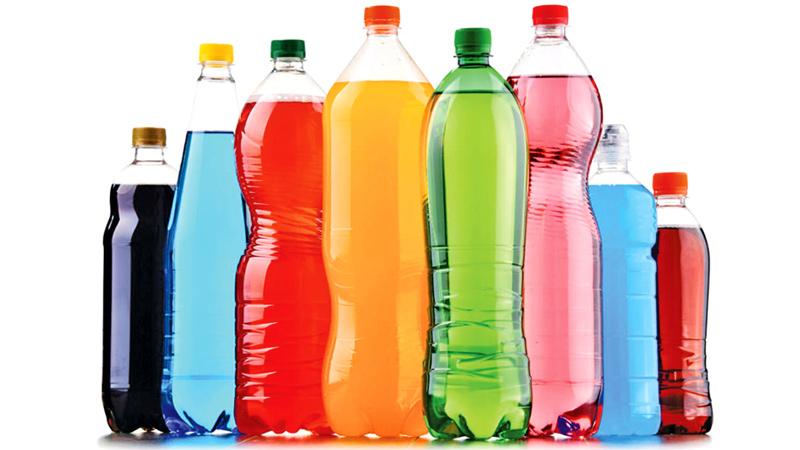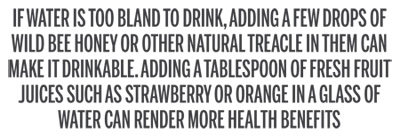
 Water is an essential requirement for all living beings, plants and animals alike. Potable water is the best drink in the world to quench thirst and fulfil the body’s water requirements. Water, which has no substitute, hydrates and replenishes the body effectively without causing harm.
Water is an essential requirement for all living beings, plants and animals alike. Potable water is the best drink in the world to quench thirst and fulfil the body’s water requirements. Water, which has no substitute, hydrates and replenishes the body effectively without causing harm.
At the inception of human civilisation, water has been the sole drink for humans. They alleviated hunger with solid food such as meats or yams. Water had been their only liquid to quench thirst.
Later on, as civilisations advanced, they learnt that liquids derived from plant as well as animal sources were suitable for human consumption. Thus, fruit and vegetable juices and milk became part of their diet. Humans learnt to boil water and add various ingredients to it to enhance the flavour.
With the further advancement of civilisation, humans invented beverages such as tea and coffee to revitalise and replenish their body and soul. Culinary experts played a vital role in adding natural substances to enhance the flavour of such drinks.

Some experiments with liquids had led to producing intoxicating drinks such as wine and beer. Those who fell in love with the ecstasy after consuming them produced them in larger quantities. Such liquids helped digestion and rendered amusement than to fulfil the liquid requirement of the body.
In antiquity, liquids were consumed warm. With the advancement of technology, refrigerators were invented and most of the liquids which were consumed warm were converted to cold drinks.
At present, myriads of drinks can be found in the market which are commercially produced. Soft drinks, energy drinks, colas, sodas, sports beverages, fruit juices, yoghurt drinks, vegetable juices, iced tea and iced coffee include high levels of sugars and a high dose of calories.
Fad
The present generation, however, prefers soft drinks over water. Some go to the extent of replacing water with sugary drinks. Apart from colas and sodas, some prefer sipping a cup of warm or cold coffee or tea with added sugar and other chemical substances to enhance flavour.
Generally, it can be observed that those who consume more sugary drinks are rash eaters. They are least concerned about their health nor make dietary decisions wisely. They tend to eat foods that contain high sugar, fat and salt which produce more calories and cause non-communicable diseases. Healthy foods such as vegetables, fruits, cereals, whole grains with more dietary fibre and nuts are often ignored. People alone cannot be blamed for their destructive dietary habits. Rapid urbanisation, high-budget marketing campaigns by companies that produce unhealthy foods and drinks, increased production of processed food. Lifestyle change has also played a role in developing unhealthy eating patterns in people of which non-communicable diseases are the result.
High sugar content
If you step into a supermarket, an ordinary grocery store or a restaurant in a village or city, stacks of sugary drinks under local and international brand namesare a common scene. Sugary drinks are known as soft drinks in layman’s language. It is worth investigating how this name ‘soft drinks’ derived as so-called ‘soft drinks’ cause the body to undergo a hard time regulating the substances found in such sugary drinks. They also produce high calories.
 The bottled sugary drinks that are found in the store come in different volumes starting from 100 ml up to 1.5 litres. (Most of the drinks are packaged in plastic bottles and discarded after consuming them. Hence, the damage they cause to the environment is immense). A bottle of 100 ml sugary drink contains about 3-5 teaspoons of sugar. The official website of the world-famous cola company state that 100 ml of their drink contains 10.6g of sugar (2 teaspoons)
The bottled sugary drinks that are found in the store come in different volumes starting from 100 ml up to 1.5 litres. (Most of the drinks are packaged in plastic bottles and discarded after consuming them. Hence, the damage they cause to the environment is immense). A bottle of 100 ml sugary drink contains about 3-5 teaspoons of sugar. The official website of the world-famous cola company state that 100 ml of their drink contains 10.6g of sugar (2 teaspoons)
Some people unintentionally drink about 500 ml to 1 litre of sugary drinks a day. Some are accustomed to eating their meals, which too are often full of oil, salt and starch while sipping a soft drink instead of water.
Energy drinks are normally sweeter than colas or sodas. So, they contain an even higher amount of sugar (perhaps 3-5 teaspoons per 100ml). They contain a high amount of caffeine that can raise blood pressure.
Packaged fruit juices can also contain a high amount of sugars both naturally occurring and added.
If a person drinks 1 litre of sugary drinks a day, he unintentionally puts about 10 teaspoons of sugar into his body. If this habit is a regular one, he cannot escape from becoming a diabetes patient.
The Government initiated a program to label the sugar content of soft drinks which is unknown to the consumer. It was made imperative for the beverage companies to label their drinks as ‘high sugar’, ‘medium sugar’ or ‘low sugar’. This helps the consumer to be mindful of his sugar intake when he craves a ‘soft drink’ to quench thirst.
Although canned and bottled drinks cannot surpass the health benefits of natural and fresh drinks void of chemicals and toxins, it is often a good practice to check the level of sugar in them whenever the urge to sip a sugary drink arise.
Damaging health
Soda, cola, soft drinks, energy drinks, sports drinks or whatever the name people give to them, sugary drinks are not at all healthy. They contain no nutrients. Next time if you feel like sipping a soft drink, do not forget to look at the ‘nutrition facts’ of the label. You may see zero percent of vitamins, minerals and other vital nutrients, but a considerable percentage of caffeine and a high percentage of calories. The bottom-line is sugary drinks are not at all healthy. Moreover, regular intake of them can impair health. Due to the high calories present in them, they can increase body weight too.
Studies found that sugary drinks are associated with diabetes, cardiovascular diseases such as heart attacks, high blood pressure and obesity.
Apart from the high sugar content, soft drinks are laden with artificial colours, flavours and preservatives which can cause numerous diseases and impairments in the body and mind.
Adolescents and children are more prone to desire such colourful and flavourful drinks. They run a risk of developing non-communicable diseases early in their life. Studies have also found that regular intake of sugary drinks has caused premature death.
Research found that soft drinks can affect bone health detrimentally.
Marketing strategies
Beverage companies across the globe make large budgetary allocations for marketing their unhealthy sugary drinks. It is natural for the public to fall prey to their eye-catching and mouth-watering marketing campaigns on the media.
In Sri Lanka, there are many celebrities who earn hefty sums by appearing in such commercials which sell unhealthy and disease-causing food and drinks. Companies, as well as the celebrities such as sports personalities, actors and singers, know that if they recommend, the public will purchase anything, even if they are pernicious to health.
It is pathetic to note that the celebrities use their stardom for injuring the health of their spectators. Increased awareness of such marketing strategies and the injurious effects of such food and drinks can minimise their consumption by the masses.
It should be noted that some beverage companies have influenced consumers to drink their sugary drinks instead of water with meals. A beverage company in Sri Lanka strongly convinces the consumers with their oft-repeated advertisement on the media with a marketing tagline which says ‘No XXX (name of the sugary drink), no food”.
Energy drinks may instantly give you wings, but in the long run, they cause you to shed your wings.
Healthy substitutes
That is to say, water is the best drink in the world. Adequate intake of water in a day can keep many diseases at bay. Drinking a glass or two of warm water in the morning is therapeutic. In Japan, it is known as water therapy to cure many diseases.
There are many natural and fresh liquids that are easily procurable in Sri Lanka. King coconut water can be considered the best substitute for sugary drinks as it provides the body with the necessary calories and electrolytes to hydrate the body. It is sweet in taste and refreshing. Sugary drinks addicts can change their lifestyle by switching to king coconut water instead of unhealthy drinks when the urge to drink sugary drinks arises.
Coconut water contains a considerable amount of nutrients and is healthy. Juices made of fresh fruits and vegetables are refreshing and nourishing. Wild bee honey, treacle made from jaggary palm, coconut and palmyrah can be healthy sweeteners in comparison to the ordinary crystal or powdered sugar or sugar syrup. Tea and coffee are healthier than colas, sodas and other sugary drinks, yet should be consumed moderately.
If water is too bland to drink, adding a few drops of wild bee honey or other natural treacle in them can make it drinkable. Adding a tablespoon of fresh fruit juices such as strawberry or orange in a glass of water can render more health benefits.
Milk is a good source of vital nutrients such as calcium, vitamin D, vitamin B6, vitamin B12, and other micronutrients and protein.
(Dr. Naveen De Soysa is the Assistant Secretary of the Government Medical Officers’ Association and the Registrar in Community Medicine at the National Institute of Health Sciences. Panchamee Hewavissenti is a culinary researcher and recipe creator)
